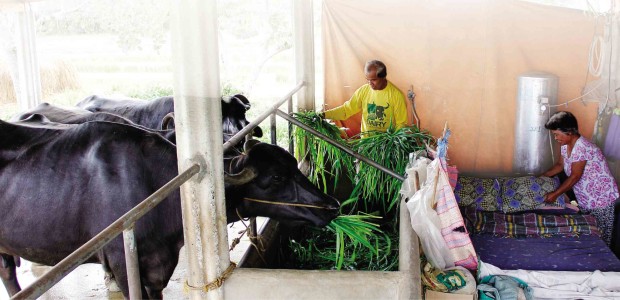Carabaos bring fortune to Ecija farming couple

DAIRY farmer Victoriano Dumale feeds his lactating carabaos while wife Dominga fixes their bed beside the animals’ feeding trough. Anselmo Roque/Inquirer Central Luzon
A FARMING couple in the Science City of Muñoz in Nueva Ecija province has taken great lengths to keep its investments very secure—to the point of sleeping with them.
Victoriano and Dominga Dumale literally have set up a bed next to their herd of dairy carabaos in Barangay Licaong to make sure that the animals are healthy and to keep rustlers at bay.
“I feed them every two hours in the evening,” says Victoriano, 59. His wife Dominga, 61, bathes all seven carabaos and keeps the corral clean and fresh.
“Our three lactating carabaos need to be fed appropriately to sustain their nutritional needs,” Victoriano says. “In return, they yield a lot of milk which gives us good income.”
“We consider them our children. That’s why we have to lavish them with our attention,” he says.
Article continues after this advertisementEach day, the Dumale couple milks the carabaos for 30-45 minutes, occasionally assisted by their son. Victoriano delivers the milk to a dairy cooperative in the city which sends it to a processing plant in Talavera town, also in Nueva Ecija.
Article continues after this advertisementVictoriano returns to the corral for the daily chores. He only goes home to take his meals.
The couple’s devotion for the animals has reaped good fortune. They have sent their children to college, acquired appliances and motor vehicles.
“We had a very difficult life then when we were not yet engaged in carabao dairying,” Victoriano says. “We had been approaching many people to secure loans to make both ends meet.”
In 1989, after the couple wed, Victoriano produced rice at his 3,500-square-meter farm during the rainy season and onions during the dry season. Dominga served as housekeeper for a boarding house and accepted laundry jobs.
“I used to harvest 45 cavans of palay and earned P10,000 from the onion crop,” Victoriano says.
In 2010, Victoriano learned that the Philippine Carabao Center (PCC) was providing dairy water buffaloes through a “paiwi” (consignment) contract to prospective farmer-trustees. He joined a dairy cooperative and was provided with a Brazilian water buffalo.
“I learned from my training that dairy carabaos have changed the fortunes of many farmers. I resolved at once to adopt the animal as a family member,” Victoriano says. “I even named it Freda, which was taken from the name of my son, Freddie Boy.”
Freda did not fail Victoriano’s expectations. Within a year, it gave birth. In four months, his total earnings from the animal’s milk amounted to P68,000.
In 2011, Victoriano engaged in dairying full-time. He acquired two more water buffaloes from PCC and named them Zeny and Ola. In due time, he owned a herd of seven, including four calves.
Thanks to Freda and the herd, the couple’s daughter Princess is now a civil engineer and son Freddie an agriculture graduate; both of them are gainfully employed. The other son, Alexander, is a welder.
Their erstwhile bamboo and cogon grass barn has been replaced with a concrete corral, which is provided with a water pump and other dairy machines.
The Dumale couple decided to set up their bed near the animals’ feeding trough when they improved the barn.
“We wanted to be near our ‘babies,’” Victoriano says. “I don’t mind getting up every two hours at night to feed them napier grass and a mixture of rice bran, dairy concentrates, vitamins and molasses.”
The owners do not leave the corral even during storm, which has drawn the mockery of neighbors, Victoriano says. “I don’t mind them. After all … I earn at least P15,000 every 15 days from the milk’s proceeds,” he says.